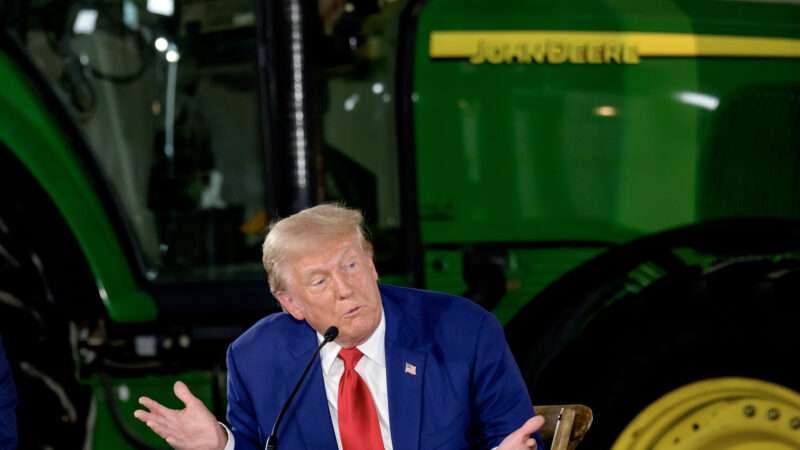
During his first run for the presidency in 2016, Donald Trump pledged to "drain the swamp"—ridding Washington of the corruption and lobbying that make politics so distasteful.
But ironically, lobbying was one of the few industries to benefit from his protectionist trade policy. Now, with Trump promising across-the-board tariffs on all imports—including from Canada and Mexico—lobbying firms are loading up on clients hoping to petition the government for relief.
"The sweeping tariffs that President-elect Donald J. Trump imposed in his first term on foreign metals, machinery, clothing and other products were intended to have maximum impact around the world," writes The New York Times' Ana Swanson. But when companies complained about the ruinously expensive duties—as high as 25 percent, on certain products from China—"the Trump administration set up a process that allowed them to apply for special exemptions….That ignited a swift and often successful lobbying effort, especially from Washington's high-priced K Street law firms, which ended up applying for hundreds of thousands of tariff exemptions."
The number of trade lobbyists increased in tandem, growing from 921 in 2016 to a record 1,419 in 2019.
According to a 2021 report from the Government Accountability Office, the Office of the U.S. Trade Representative (USTR) received more than 53,000 "exclusion requests" between 2018 and 2020. Additionally, "the Commerce Department received nearly 500,000 exclusion requests for the tariffs on steel and aluminum," which ranged between 10 percent and 25 percent, writes Swanson. "The most prolific single requester, Alloy Tool Steel, put in nearly 40,000 requests for exclusions."
No surprise, the government apparently played favorites when issuing exemptions. "Politically connected companies were significantly more likely to receive valuable exemptions from the tariffs imposed on U.S. imports from China during the Trump administration," concluded a report published last month. Of those 53,000 requests for exemption, the vast majority—87 percent—were denied. The authors of the study examined 7,015 applications, of which only 1,022—14.5 percent—were approved. But the authors found that prior campaign contributions to Republicans improved a company's chances, while prior contributions to Democrats lowered a company's odds by a similar amount.
"From the outset, the tariff exemption process seemed ripe for political influence," Reason's Eric Boehm wrote at the time. "The new report seems to confirm that is exactly what happened."
Indeed, there was evidence even during Trump's administration that the process was not on the up and up: A 2019 memo from the Commerce Department Office of the Inspector General noted "the perception of undue influence" in the exemption review process and "the appearance" that it was "not transparent and that decisions are not rendered based on evidence contained in the record."
But it's not even just Republican-affiliated firms that got special treatment: Apple, one of the wealthiest companies on the planet, received repeated exemptions throughout Trump's presidency.
"Apple has gotten far softer treatment under Trump's trade policy than other companies have, sparing much of its sprawling supply chain in China," Yahoo! Finance columnist Rick Newman wrote in November 2019. "Commerce has granted 62.5% of Apple's requests for tariff exemptions on the largest set of tariffed products….The exemption rate for all companies requesting exemptions is just 5.9%." Additionally, the department "reviewed 100% of Apple's exemption requests," whereas "the average for all companies is just 10.9%."
Apple by no means leans Republican: Its employees routinely give more to Democrats than to Republicans by considerable margins, and CEO Tim Cook endorsed Hillary Clinton, Trump's rival, in 2016. But early on in Trump's first term, Cook "developed a personal relationship" with him "built, in part, by zeroing in on areas of mutual interest between Apple and Trump's agenda," as Chip Cutter and Aaron Tilley of The Wall Street Journal wrote last week.
"The heads of smaller technology companies have grumbled that prominent businesses like Apple have been more able to catch the attention of the White House, and that they appear to be receiving more exclusions than other companies," the Times wrote in November 2019. Indeed, Trump later delayed the implementation of tariffs that would have applied to MacBooks and iPhones after meeting personally with Cook, whom he said "made a compelling argument."
Companies hoping to cozy up to the new administration are simply acting in their and their shareholders' self-interest, using legal remedies to hopefully circumvent financial penalties imposed by executive decree. But when the system can be gamed so simply, it undercuts the argument that across-the-board tariffs are necessary.
Clearly, the best maneuver is to remove all tariffs and let the market decide which products and companies to reward. But failing that, it looks like the legacy of Trump's terms in office will be turning lobbying into a growth industry.
The post Trump's Tariffs Are Already Creating Jobs—in Lobbying appeared first on Reason.com.







